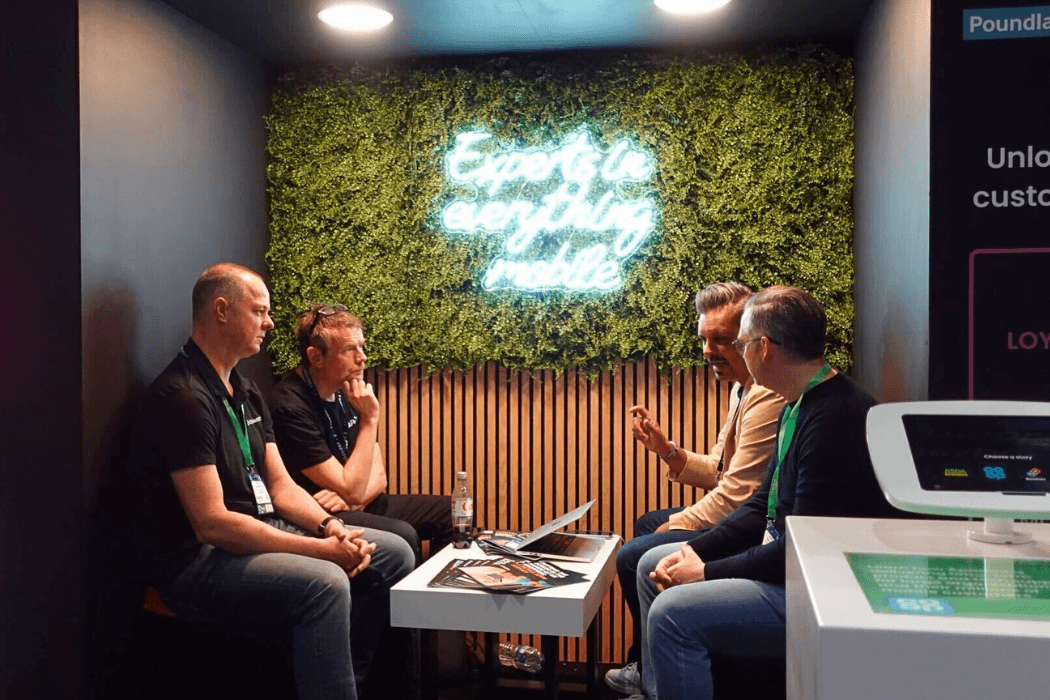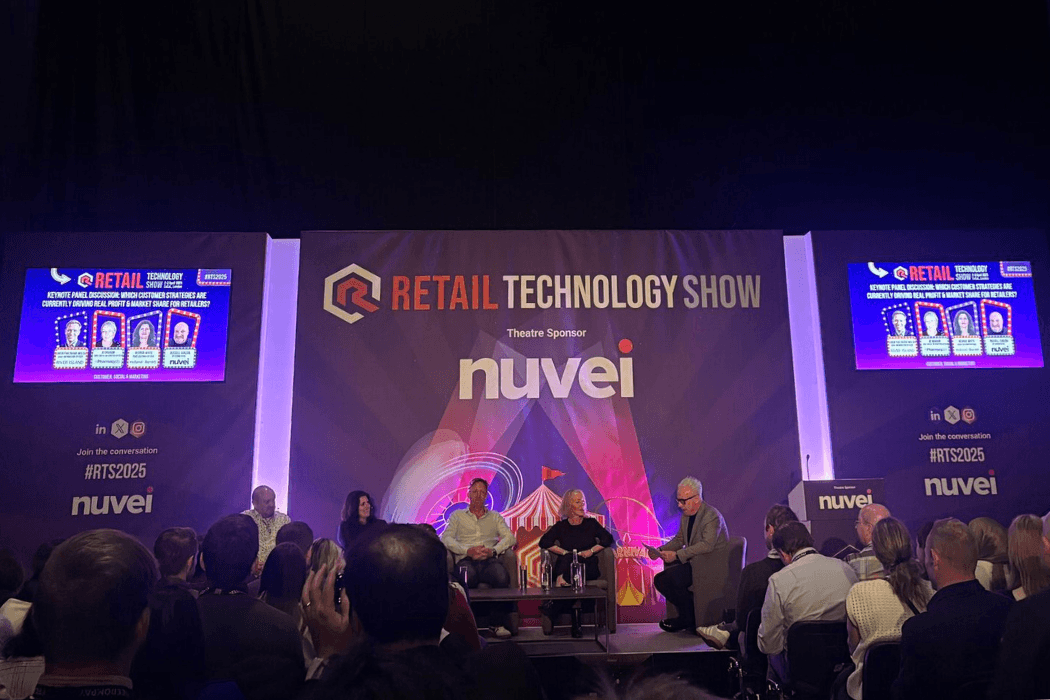Retail Tech Show 2025: What leading brands shared on the future of mobile, loyalty and retail experiences
Date
03/04/2025
Time
09:00 am
Location
London ExCel
About the event
As the dust settles on Europe's biggest retail technology event of the year, we take a look back at some of the key insights shared by the industry’s brightest minds.
Apadmi’s mobile experts had the opportunity to both attend and exhibit at the show, where the conversations that stood out to us weren’t just about platforms or tools. They were about agility, empathy, and the real meaning of loyalty: where mobile, data and customer insight converge to create meaningful, real-time value.
From legacy giants embracing AI to digital-first disruptors doubling down on app ecosystems, here are five learnings we took away from Retail Tech Show 2025, with insights from the brands and leaders shaping what comes next.

The rise of smart, personalised, mobile experiences
Retailers aren’t just building apps, they’re building ecosystems; ones that live in people’s pockets, evolve with their behaviours, and offer value far beyond the transactional.
Take Holland & Barrett. Executive Chair, Alex Gourlay, shared more about their transition to becoming digital-first. This has not been an overnight switch, but rather a process of daily, incremental change.
A standout moment in their mobile experience journey? Their “H&B and Me” app, which uses AI to help users understand their biological age and make health-conscious decisions based on tailored product recommendations. This is tech with a purpose: holistic, empathetic, and personalised to customers’ needs.
Over at Papa John’s, Senior Director David Rose explored how their mobile app consistently outperforms the website. Gamified onboarding, speed-to-reward, and relevance are driving frequency and retention for the brand.
Harrods, meanwhile, is embracing a test-and-learn approach, launching MVPs and refining them across lower-traffic sites before wider rollout. This re-enforces the importance of a mobile product mindset that focuses on iterative improvement.
It was clear that for these brands, mobile is no longer a bolt-on. It’s the foundation of how brands connect, serve, and evolve with their customers, especially when intelligent, time-appropriate personalisation is also leveraged.

Digital loyalty: from points to personal connection
We all know that digital customer loyalty has been through quite the transformation over the past decade. Where points once reigned, today’s most effective programmes deliver something more emotional to customers to create a stronger connection through recognition, values alignment and real-time relevance.
Papa John’s shared that their ‘Papa Rewards’ loyalty programme is laser-focused on lifecycle thinking, from acquisition to reactivation, using A/B testing to sharpen engagement at every step.
Meanwhile at Dunelm, loyalty is an important part of their roadmap, but personalisation and authenticity are now taking centre stage. “It takes a village to drive a social order,” said Paul Kerrison, Dunelm’s Director of Engineering, Quality and Architecture, referencing the retailer’s community-driven social strategy where authenticity is key.

Brands including Travelodge and Poundland shared how they are integrating charitable giving as a loyalty enhancer, leveraging micro-donation platforms such as Pennies to create a sense of purpose that extends beyond the checkout.
Brands are increasingly recognising that the need to build more genuine relationships, they need to go beyond usual customer expectations to stand out. Fast rewards still matter, but so do relevance, values, and emotional connection.
AI and augmented intelligence are driving efficiency
AI and generative tech have started to cross from hype into habit. The leading voices at Retail Tech Show 2025 weren’t just talking about AI, they were showing early results from actually implementing these technologies.
Nuno Miller, Digital Chief Officer at N Brown, shared how they’ve slashed product release cycles from 48 hours to 10 minutes by leveraging the right tools. They are now using Gen AI to optimise product descriptions based on customer group preferences, driving a decrease in returns whilst boosting customer satisfaction.
SHEIN’s Head of Strategic and Corporate Affairs, Peter Pernot-Day, discussed their “augmented intelligence” model, a smart application of real-time data across design, production and logistics to power trend responsiveness all whilst minimising waste.
John Lewis and Waitrose are also leveraging AI, but are focussing on implementing it on the operational side first. Chief Data and Insight Officer, Barry Panayi, shared that they are currently using AI for supply chain optimisation, internal tools, and automation and will be expanding its use into deeper personalisation in the future.
Meanwhile Currys are pushing the limits of smart search, exploring how queries like “speakers for the beach” can evolve into highly nuanced, context-aware shopping tools. Their focus is to give customers the tools to make confident decisions amid a sea of similar SKUs.
Overall, retailers are realising that AI isn’t a single product, or something they ‘should just do’ for the sake of it, it should be part of a wider, thought-through strategy. Applied smartly, it can optimise the back-end and deliver front-end delight.

Seamless omnichannel is non-negotiable
Something that was clear across multiple talks was that customers often don’t care what tech you use, they simply expect fast, intuitive, consistent experiences. The most forward-thinking retailers are laser-focused on execution to deliver this seamless omnichannel experience.
Clarks shared a brilliant example of this. Chief Information Officer, Simon Clarke, explained how they’ve moved from MVPs to MLPs (Minimum Loved Products) prioritising real-time inventory access, Apple Pay, and in-store tech that connects the physical to the digital. This is part of what he called an “organisation project.”
ASDA’s Chief Information Officer, Rob Barnes, prefers the term unified commerce, reminding us that different customers define convenience in different ways. His focus? Empowering the 150,000 colleagues who bring that customer experience to life in stores.
AS Watson’s Head of Customer and Digital Transformation, Jacqueline Joel, highlighted the need for structural change. It is imperative to bring store systems, CX, and tech into collaborative teams with shared KPIs. Tech isn’t an enabler from the sidelines; it needs a seat at the table.
For retailers wanting to remain relevant in 2025, omnichannel success is largely about internal alignment, customer-centric execution, and making sure your tech serves your people and your end-users, not just your business needs.

Culture, agility, and collaboration over “more tech”
What really stood out over the two days of talks wasn’t just the platforms or solutions, it was the emphasis on people, process and progress.
“Invest in people first, then tech,” said Holland & Barrett's Alex Gourlay. And across sessions, we heard echoes of this: test small, fail fast, move forward.
Head of Online Trading at Currys, Komal Koul, talked candidly about legacy infrastructure and the trade-offs required to become “future ready.” Her advice to peers? Focus on the three drivers of change: process, people and technology, specifically in that order.
Harrods, Clarks, and River Island all spoke to the need for agility, simplicity and customer intuition while resisting the lure of trend-chasing and building teams that can respond to actual customer needs.
No amount of tech can replace a culture of curiosity, experimentation and empathy. The brands who thrive next won’t just invest in innovation, they’ll embed it across every function with an aligned view of its purpose.
In summary
From wellness apps to frictionless loyalty, intelligent product curation to in-store iPhone checkouts, it’s clear that retail is being redefined not just by what’s possible, but by what’s personal.
The leaders shaping this future aren’t chasing trends, they’re choosing purpose, precision, and progress to build digital ecosystems that empower customers and teams alike.

At Apadmi, we’re proud to partner with brands such as ASDA, Domino’s and Poundland, wherever they are on this journey. Reach out to how we can help you create seamless omnichannel experiences through digital products that leverage the latest tech whilst exceeding customer expectations.
Share



